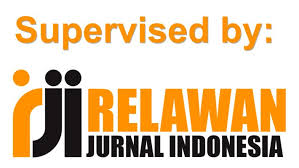Indikator Pembentuk Resiliensi Matematis Mahasiswa Prodi Pendidikan Matematika FKIP
Abstract
Abstract
Mathematical resilience is a mathematical ability that shows endurance and flexibility when studying and mastering mathematics. This research is a quantitative research that aims to analyze the variables forming the indicators of mathematical resilience ability in mathematics education study program students FKIP. The research subjects consisted of 178 students of Mathematics Education Study Program FKIP. All questionnaires were given to the questionnaire containing 33 variables forming mathematical resilience. Research data were analyzed using Factor Analysis. The results showed that 9 (nine) indicators could be formed as indicators for forming mathematical resilience of FKIP mathematics education study program students. Each of the 9 (nine) indicators is built by several variables which are the variables forming the mathematical resilience indicators.
Keyword: Mathematical Resilience, Factor Analysis
Abstrak
Resiliensi matematis merupakan kemampuan matematis yang menunjukkan daya tahan dan daya lentur ketika mempelajari dan menguasai matematika. Penelitian ini merupakan penelitian kuantitatif yang bertujuan menganalisis variabel-variabel pembentuk indikator kemampuan resiliensi matematis pada mahasiswa prodi pendidikan matematika FKIP. Subjek penelitian terdiri dari mahasiswa prodi pendidikan matematia FKIP sebanyak 178 orang responden. Kepada seluruh responden diberikan kuisioner yang berisi variabel-variabel pembentuk resiliensi matematis sebanyak 33 statement. Data hasil penelitian dianalisis menggunakan Analisis Faktor. Hasil penelitian menunjukkan bahwa dapat dibentuk 9 (sembilan) indikator sebagai indikator pembentuk resiliensi matematis mahasiswa prodi pendidikan matematika FKIP. Masing-masing dari 9 (sembilan) indikator tersebut dibangun oleh beberapa variabel yang merupakan variabel pembentuk indikator resiliensi matematis tersebut
Kata Kunci: Resiliensi Matematis, Analisis Faktor.
References
Boekarts, M.; Pintrick, P.; Zeidner, M. (2000). Handbook of Self-Regulation. California: Elseiver Academic Press
Glantz, M. & Johnson, J. (2002). Resilience and development positive life adaptation. USA: Kluwer Academic Publisher
Gondall, J., Johnston-Wilder, S. (2015). Overcoming Mathematical Helpessness and Developing Mathematical Resilience in Parents: An Illustrative Case Study. Creative Education, 6, 526-535
Hutauruk, A.JB. and Priatna, N. (2017) Mathematical Resilience of Mathematics Education Students. J. Phys.: Conf. Ser. 895 012067
Johnson-Wilder,S., Lee,C. (2010a). Mathematical Resilience. Mathematics Teaching: 218,38-41
Johnson-Wilder,S., Lee,C. (2010b) Developing Mathematical Rsilience. BERA Annual Conference 2010. University of Marwick.
Johnson-Wilder,S., Lee,C. (2011) The Pupil’s Voice Creating Mathematically Resilient Community of Learners. Congress of European Society for Research in Mathematics Education 2011.
Johnston-Wilder, S., Lee, C., Garton, L., Goodlad, S., & Brindley, J. (2013b). Developing Coaches for Mathematical Resilience. ICERI 2013: 6th International Conference on Education, Research and Innovation, Seville, 18-20 November 2013.
Johnson-Wilder,S., Lee,C., Garton, E. and Brindley, J. (2014) Developing Coaches for Mathematical Reilience. Seville: ICERI 2014.
Johnson-Wilder,S., Brindley, J., and Dent, P. 2014. Survey of Mathematics Anxiety and Mathematical Resilience Among Existing Apprentices. Prepared for The Gatsby Charitable Foundation, with reference to Grant GAT3358/DSS. Coventry: Universuty of Marwick.
Johnson-Wilder,S., Lee,C., Brindley, J., and Garton, E. (2015) Developing Peer Coaching for Mathematical Reilience in Post-16 Students Who Are Encountering Mathematics in Other Subject. Seville: ICERI 2015
Johnson-Wilder,S., Lee,C. (2015) Developing Mathematical Resilience in School-Students Who Have Experienced Repeated Failure. Seville: ICERI 2015
Kirkley, J. 2003. Principles for Teaching Problem Solving. Indiana: Plato Learning Inc.
Kooken, J., Welsh, M., McCoach, D., Johnston-Wilder, S., Lee, C. (2013). Mathematics Resilience Scale. Storrs, CT: University of Connecticut.
Kooken, J., Welsh, M., McCoach, D., Johnston-Wilder, S., Lee, C. (2015). Development and Validation of the Mathematical Resilience Scale. Measurement and Evaluation in Counseling and Development 2016, Vol. 49(3) 217– 242
Lee, C. and Johnston-Wilder, S. (2013). Learning Mathematics – Letting the Pupils Have Their Say’. Educational Studies in Mathematics, vol. 83, no. 2, pp. 163–80.
Lugalia, M., Johnson-Wilder,S., and Goodal, J. 2015. Using ICT and Dialog Teaching: Impact on Mathematical Resilience and Attainment in Algebra of A Kenyan School Year Group. Edulearn15 Proceedings, pp. 5069-5078
Maddi, S. & Khoshaba, D. (2005). Resilience at work: How to succed no matter what life throws at you. USA: American Management Association.
Mar’at,S..2010.Psikologi Perkembangan. Bandung:PT.Remaja Rosdakarya
National Council of Teachers of Mathematics. 2000. Principles and Standards for School Mathematics. Reston: National Council of Teacher of Mathematics.
National Research Council. 2001. Adding it Up: Helping Children Learning Mathematics. In J.Kilpatrick, J.Swafford & B.Findell (eds). Washington DC: National Academy Press
Norman, E. (2000). Resiliency enhancement: Putting the strength perspective into social work practice. New York: Columbia University Press.
Padmavathy, R.D., and Mareesh, K. (2013). Effectiveness Of Problem Based Learning In Mathematics. International Multidiciplinary e-Journal. Vol 2(1)
Peatfield, N. (2015). Affective Aspect of Mathematical Resilience. Adams G.(Ed.) Proceedings of the British Society for Research into Learning Mathematics 35(2)
Reivich, K & Shatte, A. (2002). The resilience factor: 7 skills for overcoming life’s inevitable obstacles. New York : Random House, Inc.
Schoon, I. (2006). Risk & resilience: Adaptations in changing times. Cambridge University Press.
Siebert, A. (2005). The resilience advantage: Master change, thrive under pressure, and bounce back from setbacks. California: Berrett-Koehler Publishers, Inc.
Thornton, S., and Statton, J. 2012. Developing Mathematical Resilience among Aboriginal Students. In J. Dindyal, L. P. Cheng & S. F. Ng (Eds.), Mathematics education: Expanding horizons (Proceedings of the 35th annual conference of the Mathematics Education Research Group of Australasia). Singapore: MERGA
Waxman, H. C., Gray, J. P., and Padron, Y. N. (2003). Review of Research on Educational Resilience. Berkeley, CA: UC Center for Research on Education, Diversity and Excellence.
https://escholarship.org/uc/item/7x695885
Zolkoski ,S.M dan Bullock ,L. M. 2012.Reilience In Children and Youth. University of North Texas.Vol.34

This work is licensed under a Creative Commons Attribution 4.0 International License.
Penulis yang menerbitkan karyanya ke jurnal ini setuju dengan persyaratan berikut:
Penulis menyimpan hak cipta dan memberikan hak penerbitan pertama kepada jurnal, dengan karya yang secara serentak dilisensikan di bawah Lisensi: Creative Commons Attribution - Share Alike 4.0 Internasional License yang memungkinkan orang lain membagikan karya dengan pengakuan penerbitan awal dan kepenulisan karya di jurnal ini.











